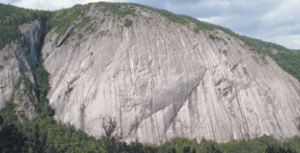|
For many years, rock climbers in western North Carolina could gaze upon Laurel Knob from afar, but could not climb it. Laurel Knob is the largest crag in the eastern United States, rising 1,200 feet from its base. Standing just at the edge of the Nantahala National Forest, the rock itself is on private property and surrounded by more private land, making it virtually inaccessible to the public. However, the aging bolts and anchors buried in the giant rock prove that more than a few climbers have stood atop the legendary, but forbidden, Laurel Knob. Rather than sneak across private property and onto the luring private rock, John Myers combined his love of climbing and interest in conservation easements to find a solution. He wanted to make it so all comers could take their chance on Laurel Knob—openly and legally. With that in mind, he joined with the Carolina Climbers Coalition (CCC) and went after the knob. Tracking down the owner in Charleston, the group spent two years surveying and negotiating before Tom German agreed to sell the property for $250,000, a bargain compared with other land prices in the area. At that point, the CCC went into overdrive raising $100,000 from people in 35 states, seven countries, and five continents in just seven months. It also secured loans for the remaining $150,000. Once the deal was struck, CCC worked with the U.S. Forest Service to build a one-and-a-half-mile trail from a parking lot to the base of the knob. While climbers may flock to the area, other recreationists also enjoy the rock from below, including the hike to it, and the water that flows off the granite forming the headwaters of the Horse Pasture River. Meanwhile, the old anchors and bolts have been replaced and the CCC is busy with fund-raising activities to pay off the loan. As more people are attracted to adventure sports such as rock climbing, kayaking, and mountain biking, private parks to accommodate them may become a fast-growing part of the recreation industry.
|
Playing with the Big Rocks
-
The Next Era of American Conservation
As we celebrate the 250th anniversary of the United States, it’s time to add a new chapter to America’s conservation legacy, with private lands, market-based tools, and bottom-up approaches at the center.
-
Success Shouldn’t Trigger Stricter Rules
An amicus brief arguing the Ninth Circuit should reaffirm that the ESA’s experimental population program is meant to reward collaboration, not penalize it.
-
Ranches Face a Generational Crisis. Virtual Fencing Can Help.
This emerging technology simplifies ranch management, reduces physical labor, and provides a level of flexibility that those stubborn traditional fences could never match.

 Asheville Citizen-Times
Asheville Citizen-Times

